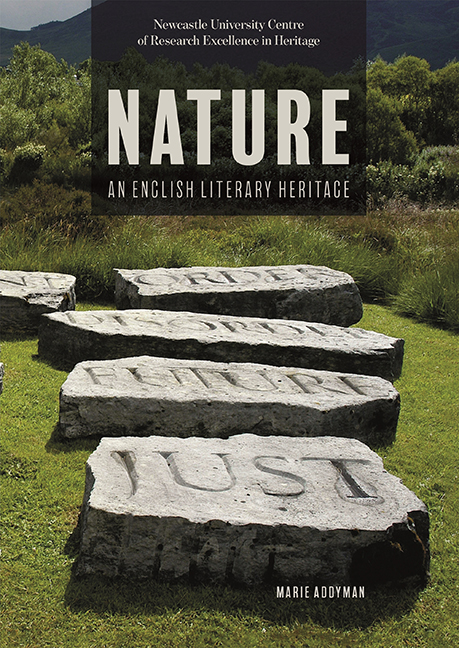Book contents
- Frontmatter
- Dedication
- Contents
- Acknowledgements
- Preface
- Introduction: Infected Minds
- I Nature as (A)morality and Mortality in Early Modern England
- II Living the Wild Life in the Nineteenth Century
- III Nature and History: Towards the Anthropocene
- Afterword: Apokalypsis
- Bibliography
- Index
- Previous Titles
- Frontmatter
- Dedication
- Contents
- Acknowledgements
- Preface
- Introduction: Infected Minds
- I Nature as (A)morality and Mortality in Early Modern England
- II Living the Wild Life in the Nineteenth Century
- III Nature and History: Towards the Anthropocene
- Afterword: Apokalypsis
- Bibliography
- Index
- Previous Titles
Summary
This chapter, concerning the way a concept of nature was utilised in late-sixteenth- and early-seventeenth-century love poetry, can easily seem the most remote from current concerns. In terms of a broader, or popular, culture, Shakespeare's is probably the only name which sparks any recognition, and he is not automatically associated with a poetics of nature: the phrase ‘the darling buds of May’, for instance, which comes from a sonnet meditating on nature, death and time (Shakespeare 1986, 85; sonnet 18, line 3), is more likely to be associated with a popular television series. The fact that this sonnet reflects and responds to preoccupations shared by his contemporaries is probably something which undergraduates are taught to recognise. They, in turn, pick up a few extra names – Sidney, Spenser, Ralegh, and in the next century certainly Donne and probably Herbert and Vaughan – and sample a few selected sonnets out of the long sequences which any poet worth his salt went in for producing and which, further along the cultural line, specialist scholars edit and discuss. And while Shakespeare, like Marlowe, Jonson and Fletcher, was a professional dramatist, what he and they adopted and transformed as poets were the themes and attitudes of a coterie culture. Their poems demonstrate a shared literary practice which was skewed to represent male interests, was in varying degrees learned, and operated from within a class connected to Elizabeth I's court. Its main members were not professional poets, but statesmen, soldiers, and above all courtiers, who shared a classical education, and some knowledge of the sonnets of the Italian humanist scholar Petrarch (Francesco Petrarca, 1304–74).
It seems hard therefore to see how such a bookish coterie culture could have had any immediate resonance within a society in which many of its members were not only illiterate but saw nature necessarily as that against which they had to struggle to survive. For ourselves so many centuries later, while we may be fascinated by ‘the strange texture of past cultures’ (Grafton, introduction to Vico 1999, xiii), it might seem that what we can say at best is that ‘through the brilliance of an image, the distant past resounds with echoes’, while acknowledging that ‘it is hard to know at what depth these echoes will reverberate and die away’ (Bachelard 1994, xvi).
- Type
- Chapter
- Information
- Nature: An English Literary Heritage , pp. 21 - 48Publisher: Boydell & BrewerPrint publication year: 2021



